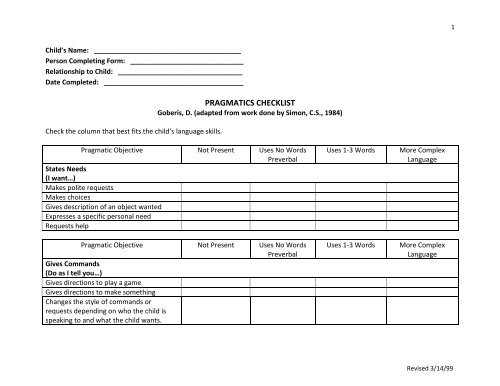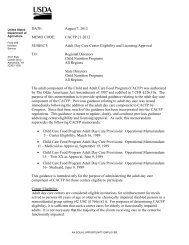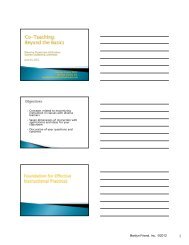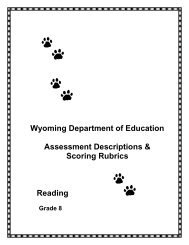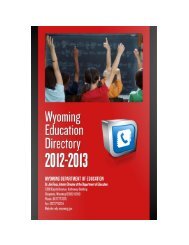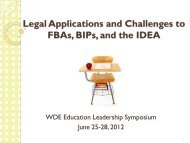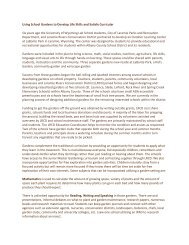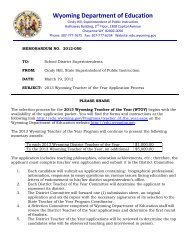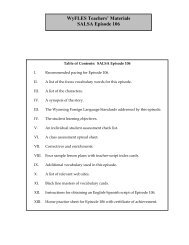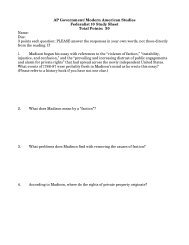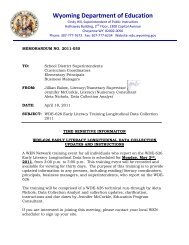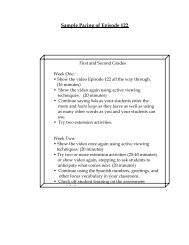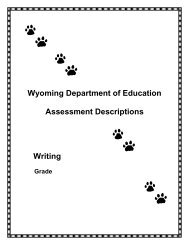PRAGMATICS CHECKLIST
PRAGMATICS CHECKLIST
PRAGMATICS CHECKLIST
You also want an ePaper? Increase the reach of your titles
YUMPU automatically turns print PDFs into web optimized ePapers that Google loves.
Child’s Name: _______________________________________<br />
Person Completing Form: ______________________________<br />
Relationship to Child: _________________________________<br />
Date Completed: _____________________________________<br />
Check the column that best fits the child’s language skills.<br />
<strong>PRAGMATICS</strong> <strong>CHECKLIST</strong><br />
Goberis, D. (adapted from work done by Simon, C.S., 1984)<br />
Pragmatic Objective<br />
States Needs<br />
(I want…)<br />
Makes polite requests<br />
Makes choices<br />
Gives description of an object wanted<br />
Expresses a specific personal need<br />
Requests help<br />
Not Present Uses No Words<br />
Preverbal<br />
Pragmatic Objective<br />
Gives Commands<br />
(Do as I tell you…)<br />
Gives directions to play a game<br />
Gives directions to make something<br />
Changes the style of commands or<br />
requests depending on who the child is<br />
speaking to and what the child wants.<br />
Not Present Uses No Words<br />
Preverbal<br />
Uses 1-3 Words More Complex<br />
Language<br />
Uses 1-3 Words More Complex<br />
Language<br />
1<br />
Revised 3/14/99
Pragmatic Objective Not Present Uses No Words<br />
Preverbal<br />
Personal<br />
(Expresses Feelings…)<br />
Identifies feelings (I’m happy.)<br />
Explains feelings (I’m happy because it’s<br />
my birthday.)<br />
Provides excuses or reasons<br />
Offers an opinion with support<br />
Complains<br />
Blames others<br />
Provides pertinent information on request<br />
(2 or 3 of the following: name, address,<br />
phone number, birth date)<br />
Pragmatic Objective<br />
Interactional<br />
(Me and You…)<br />
Interact with others in a polite manner<br />
Uses appropriate social rules such as<br />
greetings, farewells, thank you, getting<br />
attention<br />
Attends to the speaker<br />
Revises/repairs an incomplete message<br />
Initiates a topic of conversation (doesn’t<br />
just start talking in the middle of a topic)<br />
Maintains a conversation (able to keep it<br />
going)<br />
Ends a conversation (doesn’t just walk<br />
away)<br />
Not Present Uses No Words<br />
Preverbal<br />
Uses 1-3 Words More Complex<br />
Language<br />
Uses 1-3 Words More Complex<br />
Language<br />
2<br />
Revised 3/14/99
Interjects appropriately into an already<br />
established conversation with others<br />
Makes apologies or gives explanations of<br />
behavior<br />
Requests clarification<br />
States a problem<br />
Criticizes others<br />
Disagrees with others<br />
Compliments others<br />
Makes promises<br />
Pragmatic Objective<br />
Wants Explanations<br />
(Tell me Why…)<br />
Asks questions to get more information<br />
Ask questions to systematically gather<br />
information as in “Twenty Questions”)<br />
Asks questions because of curiosity<br />
Asks questions to problem solve<br />
(What should I do…?, How do I know…?)<br />
Asks questions to make predictions<br />
(What will happen if…?)<br />
Not Present Uses No Words<br />
Preverbal<br />
Pragmatic Objective<br />
Shares Knowledge and Imaginations<br />
(I’ve got something to tell you…)<br />
Role plays as/with different characters<br />
Role plays with props (banana as a phone)<br />
Provides a description of a situation which<br />
Not Present Uses No Words<br />
Preverbal<br />
Uses 1-3 Words More Complex<br />
Language<br />
Uses 1-3 Words More Complex<br />
Language<br />
3<br />
Revised 3/14/99
describes the main events<br />
Correctly re-tells a story which has been<br />
told to them<br />
Relates the content of a 4-6 frame picture<br />
story using correct events for each frame<br />
Creates an original story with a beginning,<br />
several logical events, and an end<br />
Explains the relationship between two<br />
objects, actions or situations<br />
Compares and contrasts qualities of two<br />
objects, actions or situations<br />
Tells a lie<br />
Expresses humor/sarcasm<br />
4<br />
Revised 3/14/99


